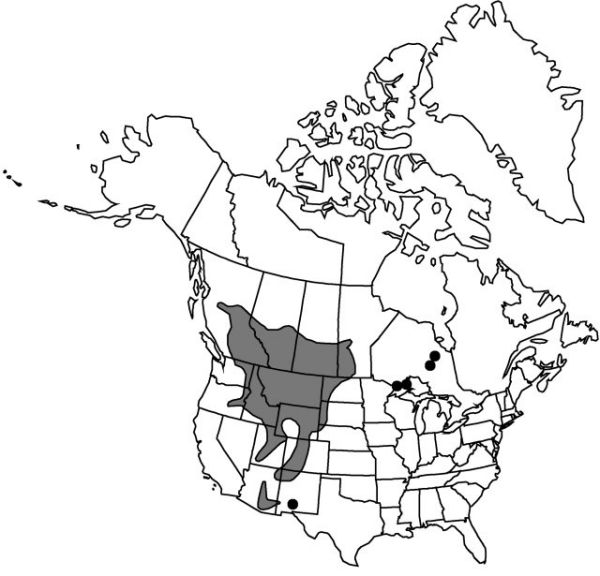Difference between revisions of "Prosartes trachycarpa"
Botany (Fortieth Parallel), 344. 1871.
FNA>Volume Importer |
imported>Volume Importer |
||
| (3 intermediate revisions by 2 users not shown) | |||
| Line 8: | Line 8: | ||
}} | }} | ||
|common_names=Rough-fruited fairy-bells;rough-fruited mandarin | |common_names=Rough-fruited fairy-bells;rough-fruited mandarin | ||
| + | |special_status={{Treatment/ID/Special_status | ||
| + | |code=E | ||
| + | |label=Endemic | ||
| + | }} | ||
|basionyms= | |basionyms= | ||
|synonyms={{Treatment/ID/Synonym | |synonyms={{Treatment/ID/Synonym | ||
|name=Disporum trachycarpum | |name=Disporum trachycarpum | ||
|authority=(S. Watson) Bentham & Hooker f. | |authority=(S. Watson) Bentham & Hooker f. | ||
| + | |rank=species | ||
}} {{Treatment/ID/Synonym | }} {{Treatment/ID/Synonym | ||
|name=Disporum trachycarpum var. subglabrum | |name=Disporum trachycarpum var. subglabrum | ||
|authority=E. H. Kelso | |authority=E. H. Kelso | ||
| + | |rank=variety | ||
}} | }} | ||
|hierarchy=Liliaceae;Prosartes;Prosartes trachycarpa | |hierarchy=Liliaceae;Prosartes;Prosartes trachycarpa | ||
| Line 39: | Line 45: | ||
-->{{#Taxon: | -->{{#Taxon: | ||
name=Prosartes trachycarpa | name=Prosartes trachycarpa | ||
| − | |||
|authority=S. Watson | |authority=S. Watson | ||
|rank=species | |rank=species | ||
| Line 53: | Line 58: | ||
|publication title=Botany (Fortieth Parallel), | |publication title=Botany (Fortieth Parallel), | ||
|publication year=1871 | |publication year=1871 | ||
| − | |special status= | + | |special status=Endemic |
| − | |source xml=https:// | + | |source xml=https://bitbucket.org/aafc-mbb/fna-data-curation/src/2e0870ddd59836b60bcf96646a41e87ea5a5943a/coarse_grained_fna_xml/V26/V26_229.xml |
|genus=Prosartes | |genus=Prosartes | ||
|species=Prosartes trachycarpa | |species=Prosartes trachycarpa | ||
Latest revision as of 21:13, 5 November 2020
Plants 3–8 dm, crisp-pubescent, glabrate or glabrous with age. Stems sparingly branched. Leaves 4–12 × 2–5 cm; blade ovate to oblong-lanceolate, subcordate to oblique basally, abaxial surface and margins moderately pubescent, hairs scattered, flattened, apex acute to short-acuminate, with 7–9 prominent veins. Flowers 1–2(–3); perianth narrowly campanulate; tepals creamy to greenish white, narrowly oblanceolate, 8–15 mm; stamens mostly exserted; filaments filiform, 10–15 mm; anthers 3–4(–5) mm; ovary broadly ovoid to obovoid, becoming 3-lobed and obpyriform after anthesis, finely papillose, ovules 2–6 per locule, horizontal; style 0.9–1.2 cm, glabrous or pubescent; stigma unlobed or 3-lobed. Berries reddish orange to bright red, 6–12(–18)-seeded, depressed-globose, 12–18 mm, strongly papillose. Seeds 4–5 mm. 2n = 22.
Phenology: Flowering late spring–summer.
Habitat: Rich, shady deciduous forests, aspen groves to open coniferous forests
Elevation: 300–2500 m
Distribution

Alta., B.C., Man., Ont., Sask., Ariz., Colo., Idaho, Mich., Minn., Mont., Nebr., N.Mex., N.Dak., Oreg., S.Dak., Utah, Wash., Wyo.
Discussion
The recently discovered populations of Prosartes trachycarpa in Isle Royale National Park, Michigan (E. J. Judziewicz et al. 1997), are noteworthy disjunctions for this otherwise western species.
Selected References
None.